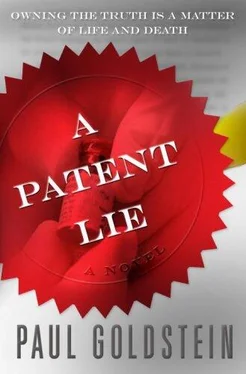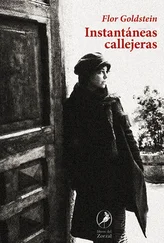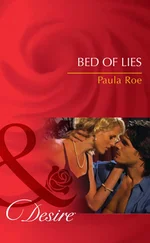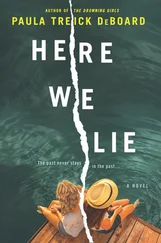Paul Goldstein - A Patent Lie
Здесь есть возможность читать онлайн «Paul Goldstein - A Patent Lie» весь текст электронной книги совершенно бесплатно (целиком полную версию без сокращений). В некоторых случаях можно слушать аудио, скачать через торрент в формате fb2 и присутствует краткое содержание. Жанр: Криминальный детектив, на английском языке. Описание произведения, (предисловие) а так же отзывы посетителей доступны на портале библиотеки ЛибКат.
- Название:A Patent Lie
- Автор:
- Жанр:
- Год:неизвестен
- ISBN:нет данных
- Рейтинг книги:3 / 5. Голосов: 1
-
Избранное:Добавить в избранное
- Отзывы:
-
Ваша оценка:
- 60
- 1
- 2
- 3
- 4
- 5
A Patent Lie: краткое содержание, описание и аннотация
Предлагаем к чтению аннотацию, описание, краткое содержание или предисловие (зависит от того, что написал сам автор книги «A Patent Lie»). Если вы не нашли необходимую информацию о книге — напишите в комментариях, мы постараемся отыскать её.
A Patent Lie — читать онлайн бесплатно полную книгу (весь текст) целиком
Ниже представлен текст книги, разбитый по страницам. Система сохранения места последней прочитанной страницы, позволяет с удобством читать онлайн бесплатно книгу «A Patent Lie», без необходимости каждый раз заново искать на чём Вы остановились. Поставьте закладку, и сможете в любой момент перейти на страницу, на которой закончили чтение.
Интервал:
Закладка:
Seeley's father cried out, “This is the ungrateful monster you raised.” He threw Seeley against the stove, and brought the gun up to his son's face. “How are you going to pay for this?”
Inside Seeley, the snapping spark of mischief fired into something fiercer. His eyes, when they caught his father's, turned defiant. As if on its own, his hand shot up and in a single swift motion seized the gun. His other hand, clenched into a fist, swung forward, striking his father high on the jaw. Seeley felt every whisker of the man's stubble. As much from surprise as from the force of the blow, his father dropped in an instant, crashing onto the floor, blood pouring from his nose. Seeley stood above the sprawling figure, his heart throbbing, but holding the gun steady with both hands. He aimed at his father's heaving chest. He heard himself shouting, “What kind of bully threatens his family with a gun? What kind of coward does that?”
His mother came away from the wall. “Don't speak to your father like that! You put that gun away and apologize this instant!”
Squeeze the trigger. Seeley remembered the seasoned cop instructing the rookie on some long-ago television show. Squeeze, don't pull. Seeley tasted metal at the back of his mouth. Carefully, he pointed the barrel toward where he imagined his father's heart would be, inches from the center of the man's chest. He squeezed. Nothing happened; the trigger, locked by the safety catch, failed to move.
His father lay motionless, the blood now bubbling from his nostrils onto the linoleum. Seeley's mother came away from the wall and grabbed for the gun, but Seeley caught her by the wrist, wrenching her arm upward. An emotion flashed behind her pale eyes that Seeley had seen before, but this time he didn't know whether it was hatred or fear, or both. Her look stopped him as he realized what he had almost done. He had never struck his father before nor stopped his mother from striking him. Now everything had changed in an instant. He felt an overwhelming sense of relief, but at the same time he understood that when he seized the gun, when he aimed it at his father, when he squeezed the trigger, he had crossed a line from which retreat was impossible. He could no longer live in his parents' house.
Seeley took a room that night at the downtown Y and for the remaining years of high school he shuttled between the Y and couches in his teammates' homes. He went to a local college, Canisius, on an athletic scholarship and took a one-room apartment off Chippewa Street, downtown, supporting himself from tutoring and part-time jobs. He did much the same when he left Buffalo to go to Harvard for law school.
Thirty-two years later, adjusting the heater vent in the rental car, Seeley could still smell the fumes of his father's alcohol. He could see the four of them frozen there in that afflicted house: him holding his mother's arm aloft, as if he were a referee and she a victorious prizefighter, her mouth locked in a wordless O; his father, sprawled dumbstruck and bleeding on the linoleum floor; and Lenny hiding in the bedroom behind the closed door. It was at that moment, Seeley now remembered, that a burst of canned laughter exploded from the television.
FIVE
There is a quality to the early-morning light in San Francisco that exists in no other American city. The sun shines silver, burnishing the stone-and-brick buildings like a jeweler's cloth. Only in the medieval quarters of old European cities had Seeley seen such light. Stepping out from the lobby of the Huntington Hotel, he smelled the scent of freshly mown grass from the pocket park across California Street at the top of Nob Hill. A large bird crowed, and the breeze coming off the bay mixed the smells of roasting coffee and just-baked sourdough.
Seeley hadn't taken a break from work for years; he had no talents as a tourist and idleness made him irritable. Setting out for the half-mile walk to the Pearsall apartment on Vallejo Street on a morning like this was all the vacation he needed. The day bristled with challenge, starting with Alan Steinhardt. Seeley had no reason to believe that St. Gall's corporate ethics were above industrial espionage, but he was also certain that neither Leonard nor Ed Barnum had told him the full story of Lily Warren's visit to Steinhardt's lab or her attempted theft of Vaxtek secrets. If, as Leonard said, Vaxtek had caught her alone in Steinhardt's lab, it would have given the story to the DA and to the press-unless Vaxtek, too, had something to hide.
What mattered right now was that St. Gall had dropped Warren as a witness, which meant that Seeley was free to talk to her without going through the company's lawyers. Before leaving the hotel he left a message for Tina to track down her telephone number.
The apartment building on Vallejo was 1930s Art Deco, and the lobby, which rose two stories, was all dark wood and ceramic tile the color of sandstone. The plaster molding along the ceiling was a maze of geometric designs, Aztec in their complexity. Seeley could imagine that, however warm it was outside, the temperature in the lobby never rose above the coolness of a crypt.
At a small desk, the doorman was talking to a girl. Seeley asked for the Pearsall apartment and, before the man could respond, the girl stuck out her hand.
“You're Mr. Seeley. I'm Lucy Pearsall, Robert Pearsall's daughter.”
In her green plaid school uniform, the girl was of a piece with the morning: clear-eyed, bright, self-assured. Seeley studied her face for some sign of loss or sorrow, but other than the dark shadows beneath her eyes, found none. Her hand, when Seeley took it, was small, but the grip was a young athlete's.
“My mother's expecting you. She said you're taking over Dad's case.” It was a statement of fact. Nothing in her voice or her expression asked for sympathy. “He was the best.”
“That's what I heard.”
When she leaned to look around him, Seeley turned. A yellow school bus had pulled into the space in front of the building.
“It was good to meet you,” she said. She swung a bulky backpack over her shoulder and was out the door.
“Impressive kid,” Seeley said to the doorman.
“Mr. Pearsall's death was a knockout blow to the two of them.” The man was looking at the school bus, not at Seeley. “But neither of them would ever let you know that.”
“Could you call up to the apartment for me?”
The man talked as he dialed the apartment telephone. “Since it happened, Mrs. Pearsall won't let her wait for the bus outside. She has to stay in here with me.”
A voice came on the line, and after the man finished and put down the receiver he said, “You know, Mr. Pearsall wasn't the kind of man that can be replaced.”
Seeley thought to tell him that he hadn't come courting. Instead, he just thanked the man for his help.
“Apartment 7C,” the man said. “Second door on your right.”
When Judy Pearsall opened the door, Seeley saw at once the source of Lucy's forthright manner. The face was handsome and intelligent and her handshake was the same firm grip as her daughter's. She wore no makeup and had made no effort to disguise the lines at the corners of her dark green eyes. Her sandy hair was cut short.
She led Seeley into a living room with tall French windows looking out onto Vallejo Street, busy with traffic. Seeley declined the offer of coffee and quickly surveyed the room. Any one of the three up-holstered chairs could have been Robert Pearsall's favorite. He took a corner of the couch.
“I'm sorry about your loss.”
“I appreciate your saying that.” The words were measured, honest. “But, you know, I can't just curl up into a hole and disappear. It wouldn't do my daughter any good, or me.”
Already, Seeley thought, she had fallen into the habit of the singular. My daughter.
Читать дальшеИнтервал:
Закладка:
Похожие книги на «A Patent Lie»
Представляем Вашему вниманию похожие книги на «A Patent Lie» списком для выбора. Мы отобрали схожую по названию и смыслу литературу в надежде предоставить читателям больше вариантов отыскать новые, интересные, ещё непрочитанные произведения.
Обсуждение, отзывы о книге «A Patent Lie» и просто собственные мнения читателей. Оставьте ваши комментарии, напишите, что Вы думаете о произведении, его смысле или главных героях. Укажите что конкретно понравилось, а что нет, и почему Вы так считаете.












